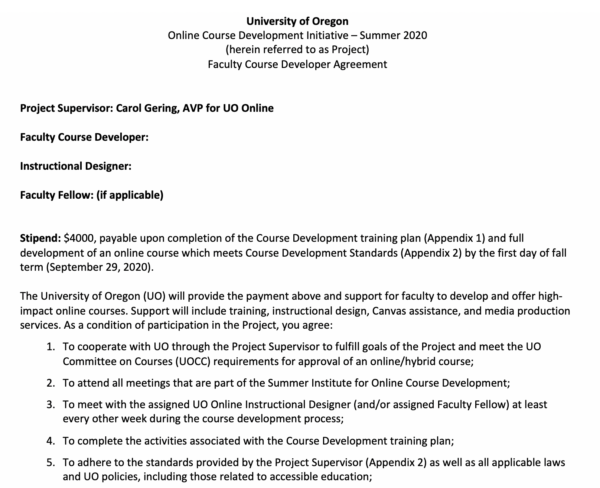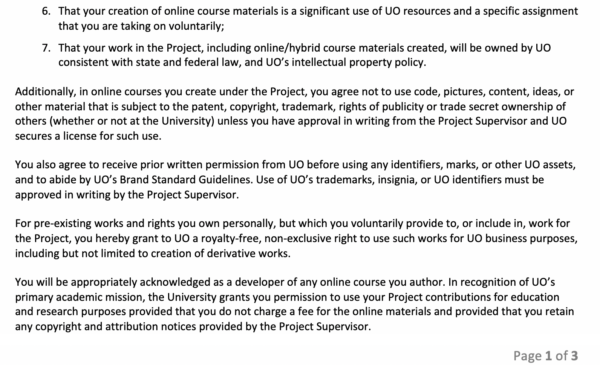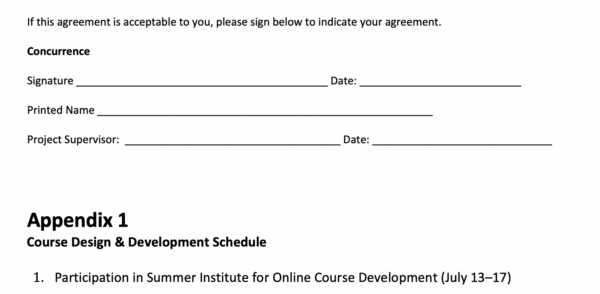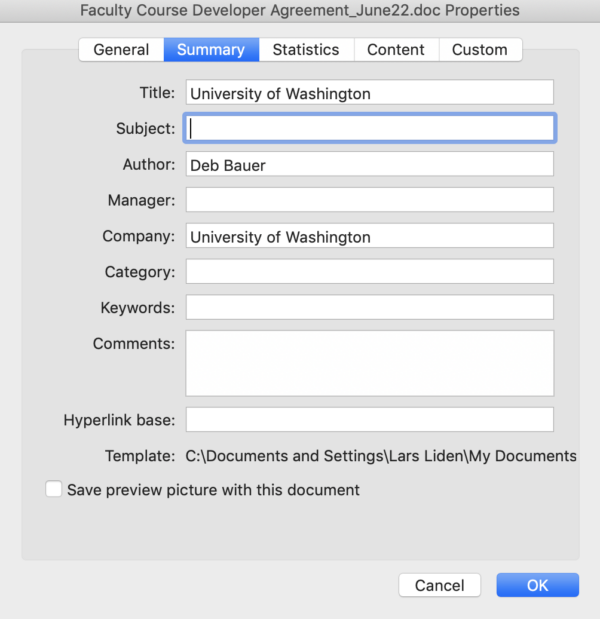The administration knows that the pandemic has put the faculty in a tough spot. So they’re taking advantage of the situation to buy our intellectual property rights on the cheap, before the layoffs start. This is the agreement that faculty must sign before participating in this summer’s online teaching improvement workshop:
Thanks to an anonymous reader for the contract. Curiously, it appears to have come from the University of Washington. I wonder if UO’s General Counsel Kevin Reed paid UW for the right to reuse it?




“you hereby grant to UO a royalty-free, non-exclusive right to use such works for UO business purposes, including but not limited to creation of derivative works.“
Carol Gering was not a good hire for this position. At a time when we need maximum flexibility her idea of what constitutes a “proper ON line course” (her words) are really quite rigid as all ON line courses should fit in the box. This does not help at these times.
What would help is if the UO were to invest in a broader suite of tools, use an ON line format that is NOT Canvas, etc ,etc …
ugh. Combine this with push to diminish career faculty, low and maybe frozen ttf numbers, and the De Vos cabal’s push to turn higher ed into certificate mills, and I wonder how long before certain departments and disciplines fade away. Wait for the next iteration of AI with 5G infrastructure in place and who needs instructors or even course administrators anymore?
sorry for the borderline conspiracy talk, but it don’t mean it ain’t so…
So, all the years you folks spent developing your curriculum, the research, your teaching experience, the one element that makes you so valuable and singular, no longer belongs to you. If that’s true, you’re expendable.
In an earlier post, I referenced the late David Noble’s book, “Digital Diploma Mills,” as the future of uni administration. That future would entail the admin usurpation of faculty curriculums that took a career to create. No one needs to tell any of you what’s at stake…
Early this year, before the campus closure, my department had a meeting with Carol Gering, Associate Vice Provost for Online and Distance Education, explicitly for the purpose of asking questions related to intellectual property rights and online course development. She assured us that the UO had no plans to deviate from the existing policies in which intellectual property developed with only “incidental use” of institutional resources would continue to be owned by faculty, as has long been customary for in-person courses.
Our primary question for her was whether or not the use of Canvas at all would be considered a “significant” or “incidental” use of resources, meaning would all online courses (not just those developed in summer workshops) automatically be considered the property of the university and thus subject to the “creation of derivative works,” as has happened at other universities, most notably Arizona State. She reassured us that the UO had no plans to change the existing policies, which still left us with questions.
This contract raises the same ongoing questions. Will this (or a similar) contract be used for all online courses, and will Canvas be considered a “significant use” of institutional resources? The UO needs to make a crystal clear statement on this issue.
Related: what is the union’s position on this? Other than a Memorandum of Understanding that the parties would agree to talk more about it, there’s nothing in the contract about intellectual property.
UO policies here: https://research.uoregon.edu/manage/innovation-impact/uo-policies-course-materials
Yes, we did have a joint committee with the head of IP (Chuck ?) and talked in circles for a very long time and never got anyplace. It wasn’t that there were huge disagreements, it was too big a field to get our arms around. When I retired both sides seemed to have lost interest. That issue of “significant” resource was defined back then as additional equipment, technology, etc. – not just Blackboard (which was the platform at that time).
Is this a violation of the CBA? We talked a lot about intellectual property in the first negotiations.
Set aside the IP questions for a moment and look at what is going on here. UO is paying out almost 200 of these $4000 stipends to faculty. Plus it is paying instructors who teach in the summer workshop. And who knows what else. So the cost of this initiative is probably approaching a million dollars.
This initiative was hatched during spring term by administrators, with minimal faculty involvement. While that was happening, the administration was trying to get faculty to swallow a pay cut plan. They told the union that there was nowhere else in the budget to make cuts. The administration also refused the union’s request for faculty to have some oversight, through the shared governance process, in how the money freed up from their paychecks would be spent. When the administration and the union couldn’t reach an agreement, the administration cut career faculty contracts. They claimed they had no choice, they had to avoid making any commitments to new spending until they knew what Fall revenue was going to look like.
How we teach students is a core domain of faculty governance. And this is discretionary spending at a time when the administration says they don’t have choices. Maybe you think this is a worthy initiative, maybe you don’t. Either way, the way it came about should raise all kinds of questions.
Good points. Thanks for this comment. $4K is a low price to pay faculty for giving up all their IP rights – especially when, from what I hear, much of this program consists of faculty sharing ideas among themselves. So a good part of the value-added is coming not from the administration, but from other faculty – who are also giving up their IP. Quite a scheme.
I think its hilarious that the doc comes from UW (good catch), but it also proves the point that this, at least for the vast majority of research institutions, is fairly standard boilerplate. If you can find a research university that doesn’t consider online courses developed via a ‘significant use of [university] resources’ their IP vs the instructors I’d be interested to see it. OSU’s IP site looks pretty much the same, and lots of people hold them up as doing a good job vs our poor job with online ed. I do think there are good questions to ask re: is using Canvas (or say Panopto now) considered ‘significant’, but that’s something that the union would probably need to take up, and hasn’t chosen to prioritize in any recent contract negotiations. As to whether or not this is a good use of resources in the moment, jeez, I’d say the admin can’t win on this one, we either complain that they’re leaving us on our own to figure this stuff out, or they’re spending too much money on it without faculty input (and there is a pandemic going on so its not like we have a year or two for the senate to form a subcommittee to discuss it). This seems a reasonable and actually productive use of funds, funds that are being paid to faculty of all sorts (the TEP and online staff are staff, they’re on 12 month contracts), from grads to TT, to build something the university desperately needs right now.
Agreed, the summer workshops are a good use of time and funds. UO just needs to clearly state that course IP belongs to faculty on- or offline, drop this contract or explain why it’s necessary, and treat all teaching the same, rather than acting like a tech company hiring temp workers to write code.
You’re confusing remote and online courses. Most of us are teaching remote this fall. Remote classes have live, synchronous meetings during scheduled class time (per academic council mandate) and are meant to substitute for the traditional in-class experience that students came to UO for. This initiative is for online classes, which are a different beast – completely asynchronous, existed long before the pandemic, and not what most students have signed up for (and therefore not what UO “desperately needs”).
Except most of us do need better training, whether or not its remote or online, and I’d prefer to be paid for that time and product as to opposed to what happened in the spring. And if you think all students prefer or can always utilize ‘remote’ over ‘online’ then you don’t really have a good sense of our student population. Even before COVID we had a good percentage of students working part to full time, often during the daytime, that makes going to a full load of classes, or ‘remote’ classes, problematic. That’s not going to change, it only worse with the pandemic. I’ve been teaching ‘online’ for a number of years in the summer, and I often have students living here in Eugene who could be in person, but need to take online because of work or childcare issues (or because they’ve gone home to China for the summer). You can wring your hands about the whole educational world going online, and I’m not suggesting that the UO do that at all, but we should have a reasonable subset of well-designed and well-taught online courses, which is what this ‘institute’ appears to be attempting. We can argue about IP issues, or the cost, or conversely that the stipends are too low, but its a reality and a necessary one for many of our students.
For the sake of transparency, and not because I share the overly cynical and pugnacious attitude reflected in this forum, I am TTF, participating in the workshop, and was not presented with or asked to sign the above agreement.
In any case, the language a “royalty-free, non-exclusive right to use such works for UO business purposes, including but not limited to creation of derivative works” seems ambiguous to me. “Business purpose” might be mean marketing or digital advertising. It might not mean academic purposes. Just because the language was drafted with a certain, innocuous intent does not mean it was drafted with the exploitative intent that yu have in mind.
Uh huh….
Why is my name on a document I’ve never seen, never used, and didn’t give to this site?
I really don’t know. I will make a PR request and see if UO will explain.
No need to bother. For the record, I’m not the author of the document.